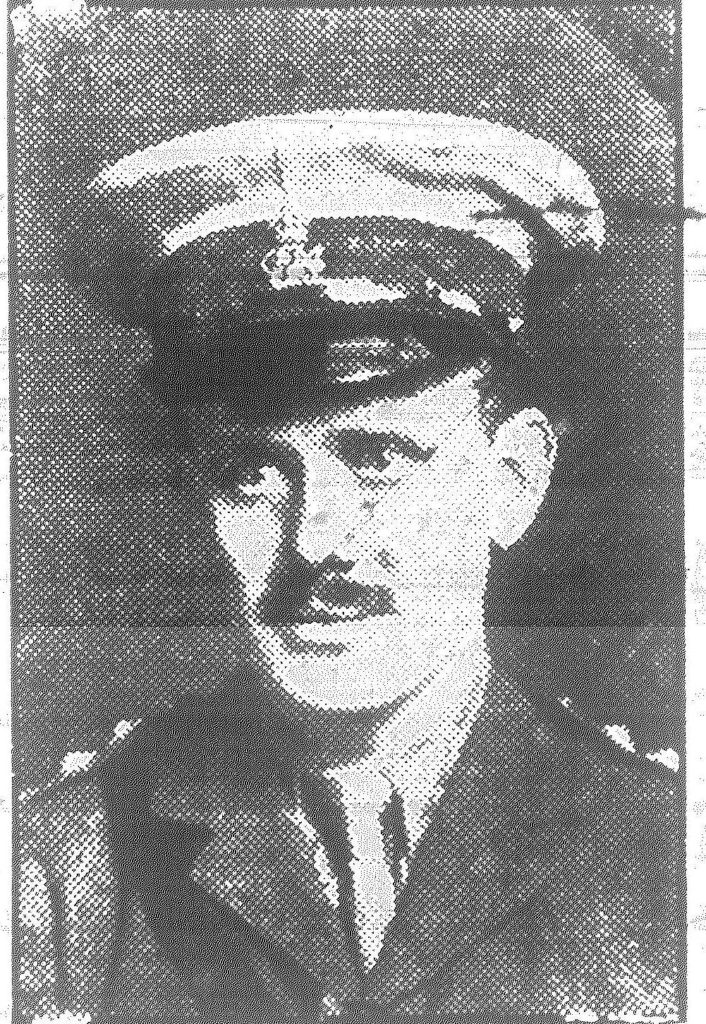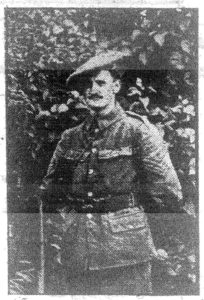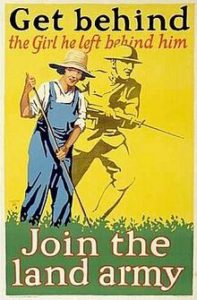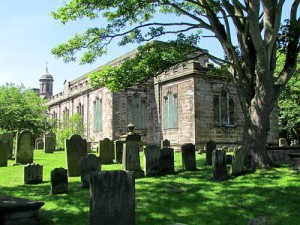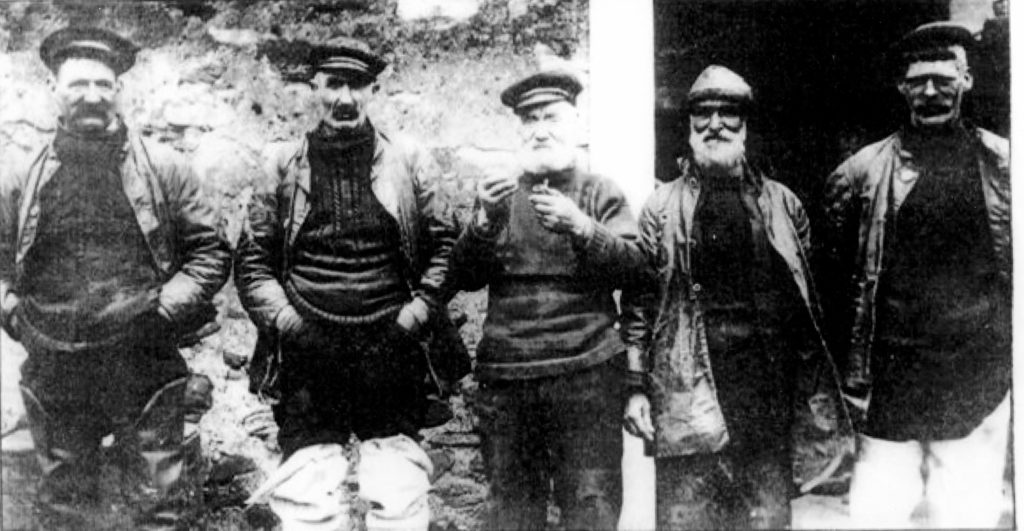
BERWICK ADVERTISER, 14 JUNE 1918
WAR NEWS
PRIVATE PETER WAITE A PRISONER
We are glad to hear that news has come to hand that Private Peter Waite, nephew of Councillor Robson, Duns, reported missing since 11th April, is now a prisoner of war in Germany. This soldier who was only 19 five days before the above date was serving his apprenticeship as a draper with his uncle, and was called to the army in June last, when he was first of all in the H.L.I., and afterwards transferred to the Royal Scots Fusiliers. He spent a few days’ leave in Berwick-on-Tweed and Duns before crossing to France on 30th March. His grandmother, Mrs Robson, resides in Berwick, and his mother is presently serving with Queen Mary’s Army Auxiliary Corps in the South of England. Private Waite’s elder brother was killed in action in France about eighteen months ago.
LOWICK

We regret to announce that Mr. G. Trotter of Beal Farm, Beal, has received word that his son, Private R. J. Trotter, whose photo we produce, has been wounded in the left leg and right shoulder, and is now recovering from his wounds in West Didsbury Military Hospital. Private R. Trotter joined a Training Reserve in January, 1917 and went to France in July, 1917. After having been there about a month he developed an attack of bronchial pneumonia and was sent over to Edmonton War Hospital, London, in August. After having recovered and received more training, he was again sent to France, this time with the West Yorks in January, 1918, and while out there was transferred to another Battalion and remained with them until wounded on May 27th, 1918. Private Trotter, being of a very quiet disposition, was respected and liked by all his chums. Prior to enlistment he was employed as a farm servant on the farm of Mr Davidson, Beal.
TWEEDMOUTH

Mr and Mrs Gray, Seton House, West End, Tweedmouth, have received a letter from their son-in-law, L. Cpl. E. Pilmer, informing them of the death of their eldest son, Signaller Jas. Gray, N.F. he states that he was killed by a sniper. His brother-in-law was with him when he was killed. Signaller Gray joined up over three years ago, and after doing some months’ training in this country he was drafted out to France. He had been there for over two years, and had been home once on leave during that time. He was of a very quiet disposition, and one who was highly respected by all whom he came in contact with. His younger brother, George, was killed in France over two and a half years ago. Previous to enlisting he was employed as a gardener, having served his apprenticeship with Mr Anderson, East Ord. We extend to Mr and Mrs Gray and family our deepest sympathy in this sad bereavement that has befallen them.
SCREMERSTON
The news was received in Scremerston by his relatives that Sergt. Wm. Mowitt, Duke of Wellingtons, has been gassed and sent to the Base Hospital. Sergeant Mowitt, who resides at Deputy Row, has been once wounded before and before joining up worked at Scremerston Colliery as a weighman. His sister is a teacher at Scremerston School.
LOCAL NEWS
About a dozen signallers of the Northern Cyclists, under the command of Lieut. Meek, attended morning service at Scremerston Church on Sunday last. The service was taken by Mr Peacock, Diocesan lay reader, in the absence of the Vicar, who is again under medical treatment in the hands of Dr Chas. Fraser.

Captain D. R. Herriot, Northumberland Fusiliers, the youngest of the three sons serving of Mr David Herriot, Sanson Seal, who has been in hospital suffering from slight gunshot wound in the jaw, is progressing favourably, though not yet out of hospital. He was educated at Cargilfield, Fetes, and Cains College, Cambridge, and is still an undergraduate and mathematical scholar of Cains. He distinguished himself highly both in the class room and cricket field at School and college, and at the commencement of war got his commission in “The Fighting Fifth,” and was wound in the second battle of Ypres in April, 1915.

At a quiet family gathering on June 1st the golden wedding of Mr and Mrs Joseph Redfearn, Parade, Berwick, was celebrated. Fifty years ago in the Parish Church, the couple were united in matrimony by the Vicar (Mr Rowe), and there have been eleven of a family, seven of whom survive. Prior to her marriage, Mrs Redfearn was a Miss Margaret Yeaman. Mr Redfearn was by occupation a cabinetmaker, and worked with Mr Patterson, who at one time had businesses in Bridge Street and Hide Hill. A piccolo player of repute, he was one of the original members of the now defunct Mechanics Band, and he also was a member of the old Berwick Volunteer Artillery Band. Mr Redfearn joined the Artillery in 1860, and took part in many big gun and carbine shoots. He was the first member of the Volunteers to win the Commercial Travellers’ Cup, and he has also a treasured possession, a gold scarf pin, presented by the father of the late Duke of Northumberland, for big gun shooting. We trust Mr and Mrs Redfearn will be spared to spend many more years of happy married life.
HORNCLIFFE
A correspondent informs us that even the birds of the air are becoming a little exasperated with the food restrictions. At Horncliffe, or at least about half a mile above the village, up stream, he witnessed a short engagement between a crow and a big seagull over a small piece of war bread which some angler had let fall by the riverside. The crow had found the prize first and was pecking vigorously at the indigestible stuff when the seagull which was circling over a neighbouring cliff observed that there was something going past him. He immediately swooped down on the crow which showed a reluctance to leave its legitimate find, crouching back over the disputes piece of bread with outspread wings and open beak. The seagull continued to set up a most appalling noise, screaming and turning just over head, and evidently this proved too much for the nerves of the crow, which ultimately evacuated the position before the superior strength of the enemy. We must say, it has been reported to us from other sources, chiefly at the seaside, that gulls are becoming very quarrelsome amongst themselves in the last year or so, whenever food is thrown to them.


